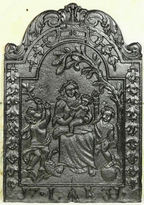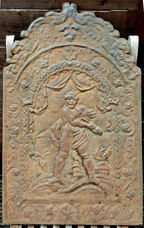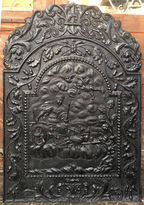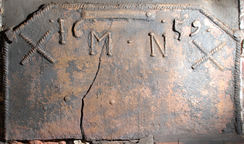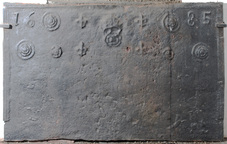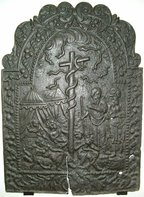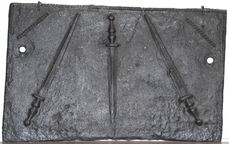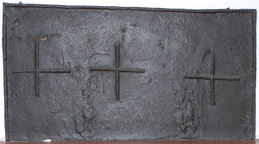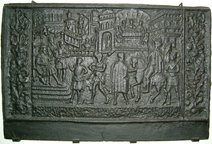-
1017
Description: Arched rectangular central panel with fillet edging; central seated female with an infant in her arms, a swan at her feet and a standing child on each side, the one to her left facing the front and holding aloft a flaming heart, its foot on a ball; the child to her right facing the woman, holding aloft a branch in its left hand, all on a ground with an overhanging tree to the right; arched rectangular border with fillet edging with descending festoons of acanthus flowers on each side, the date and initials at the bottom and, at the top on each side, a pair of acanthus flowers descending from a heart-shaped terminal of a strapwork frame; above, mirrored swirls of foliage.
Notes: The central pictorial scene is a crude pastiche of a panel portraying an allegory of Charity frequently used on firebacks produced in the Siegerland of north-west Germany for the Dutch market in the second half of the seventeenth century. The swirled foliage on the top is typical of English 'Dutch' style firebacks of the early-eighteenth century and the numerals are also more typically English in style.
Inscription: 17 . IAK[?] 31
- Decoration tags:
- 'Dutch' (shape)
- fillet (edging)
- whole carved pattern
- individual letters
- individual numbers
- allegorical
- text
- humans
- plants
Manufactured: in 1731 in England.
Current location: not known.
- Attached to series:
- Charity firebacks
- British 'Dutch' style firebacks
-
164
Description: Arched rectangular shaped central panel with hollow bead edging; draped male figure standing on undulating ground with two small trees, holding a bar, flaming furnaces behind, drapery suspended from above; Arched rectangular shaped border with fillet edging; swirled flowers and tendrils symmetrically arranged, with monogram at centre bottom; symmetrical arrangement of foliage on top.
Notes: The figure is of Pluto, one of a set of 'Eight Deities' engraved by Hendrick Goltzius (1592), after Polidoro da Caravaggio; a recasting, there is a larger (420mm x 640mm) but more corroded version in Hastings Museum. The faint initials SHR are probably those of the pattern-maker. The image is of a copy; original castings are fractionally larger.
Copies of this fireback are known.
Inscription: SHR
- Decoration tags:
- 'Dutch' (shape)
- fillet (edging)
- whole carved pattern
- mythological
- monogram
- humans
Manufactured: in the late-17th to early-18th century in England.
Current location: not known.
- Attached to series:
- SHR series
- British 'Dutch' style firebacks
- Eight Deities series
-
1059
Description: Arched rectangular central panel with bead on broad fillet edging; pictorial scene of a figure in a chariot on left, drawn across clouds by two peacocks; above, a putto and a bird flying in clouds; to the right, a tree; arched rectangular border with fillet edging; symmetrical undulating oak fronds descending from a loop; at the bottom, the letter W in a cartouche between swirled foliage; on top, mirrored swirled foliage descending from a loop.
Notes: The figure is likely to be that of Hera/Juno, who is traditionally associated with peacocks. The initial 'W' probably identifies the pattern maker; a single vertical line right of centre indicates the join between two boards that formed the pattern. The 'W' initial probably denotes the pattern maker.
Inscription: W
- Decoration tags:
- 'Dutch' (shape)
- fillet (edging)
- whole carved pattern
- planklines
- pictorial
- allegorical
- text
- humans
- plants
- objects
Manufactured: in the late-17th to early-18th century in England.
Current location: not known.
- Attached to series:
- British 'Dutch' style firebacks
- W series
-
1264
Description: Arched rectangular central panel with bead edging (top and sides) enclosing a shield, helm, crest, mantling and motto of the Fitch family, descendants of Edwin Frederick Fitch (1839-1916); above the achievement, symmetrical laurel leaves, all within an arched rectangular astragal border surmounted by, on the dexter side, a behelmeted merman holding a scimitar and, on the sinister side, a mermaid holding a mirror; top centre, three ostrich feathers gathered with a ribbon.
Notes: A pastiche of the 17th century Carolean 'Dutch' series (e.g. no. 280). Blazon: Vert, on a chevron between three leopards' faces or langued gules, as many cross crosslets fitchee of the last, in the chief point an ermine spot of the second; Crest: Upon a wreath of the colours, a leopard's face erminois pierced through the mouth with a sword broken in the middle argent, pommel and hilt or.
Inscription: FACTA NON VERBA [Actions not words]
Arms: Fitch
Manufactured: in the early- to mid-20th century in England.
Current location: not known.
- Attached to series:
- Personal armorial firebacks
-
725
Description: Canted rectangle with twisted rope edging; uneven, individually stamped letters and numerals, the initials separating the two parts of the date, which are raised slightly higher; dots are stamped on each side of each half of the date and between the initials; a twisted rope saltire at each end of the inscription.
Notes: The distinctive form of the number '5' has been seen on other firebacks indicating a common source. The plate above the inscription is a repair, as are the rivets either side of the crack.
Inscription: ·16· M · N ·59·
- Decoration tags:
- rectangular with canted top corners (shape)
- rope (edging)
- simple stamps
- carved stamps
- individual letters
- individual numbers
- apotropaic
- text
- objects
Manufactured: in 1659 in the Weald area of England.
Current location: in private hands, Upper Beeding, West Sussex, England.
- Attached to series:
- Rope design firebacks
- Shortened '5' series
-
906
Description: Rectangular; cyma recta moulded edging in short lengths (top and sides, with gap at bottom of each side); top centre, rose and crown between four small fleurs-de-lys (2 over 2); date split in top corners, with concentric roundel inside, next to upper fleurs; below date, concentric roundel, with small rose inside, next to lower fleurs; the whole arrangement symmetrical.
Notes: The only example of this series with no initials; one vertical plankline. The style of rose and crown is similar to that used in gun founding in the Tudor period, suggesting that the furnace that was the source of this fireback may have been used for that purpose.
Inscription: 16 85
- Decoration tags:
- rectangular (shape)
- complex, furniture-derived (edging)
- simple stamps
- carved stamps
- individual numbers
- planklines
- heraldic
- royal
- text
- objects
Manufactured: in 1685 in the Weald area of England.
Current location: in private hands, Upper Beeding, West Sussex, England.
- Attached to series:
- 1660s-90s Wealden series
- Fleur-de-lys firebacks
-
726
Description: Arched rectangular central panel with bead-on-fillet edging; pictorisl scene of a central cross-shaped pillar entwined with a snake; two pavilions to the left with human figures lying before them; two standing figures to the right, one holding a staff; above, clouds with snakes descending from the sky; arched rectangular border with fillet edging; on each side, descending festoons of fruit entwined with ribbon; at the bottom, a central cartouche between palm fronds; on top, foliate swirls.
Notes: The scene is an illustration of the plague of serpents visited upon the children of Israel by God (Numbers 21: 6).
Copies of this fireback are known.
Manufactured: in the mid-17th century possibly in the Siegerland area of Germany.
Current location: Victoria & Albert Museum, Cromwell Road, Kensington & Chelsea, Greater London, England.
Museum number: 291-1893 (part of the Victoria & Albert Museum museum group)
Citation: Anon., 2 Dec 1905, 'Old Kent and Sussex Fire-backs', Country Life, pp. 767-768.
- Attached to series:
- 'Dutch' Miscellaneous Firebacks
- Old Testament & Apocrypha firebacks
-
727
Description: Rectangular; twisted rope edging (top and sides); canted rope lengths across top corners; three impressions of a rondel dagger (c. 410mm) with a baluster-turned grip, the middle one per fess, pommel in chief, the other two on either side, per bend, points in chief.
Notes: The arrangement of daggers is similar to the arms of Vigures, of Launceston, Cornwall, but inverted; the plate has been pierced on each side for fixing to the back of the fireplace; the dagger (length approx. 41cm) may be of German design.
- Decoration tags:
- rectangular (shape)
- rope (edging)
- simple stamps
- objects
Manufactured: in the mid- to late-16th century possibly in the Weald area of England.
Current location: Victoria & Albert Museum, Cromwell Road, Kensington & Chelsea, Greater London, England.
Museum number: 896.1901 (part of the Victoria & Albert Museum museum group)
- Attached to series:
- Knife & Dagger stamp firebacks
-
728
Description: Quasi-rectangular; twisted rope edging (top and sides); across the centre, three crosses formed of the repeated stamping of a length of twisted rope.
Notes: The edging appears to have been formed of the same length of rope. The crosses almost certainly have Christian significance.
- Decoration tags:
- rectangular (shape)
- simple stamps
- apotropaic
- objects
Manufactured: in the 16th century possibly in the Weald area of England.
Current location: Victoria & Albert Museum, Cromwell Road, Kensington & Chelsea, Greater London, England.
Museum number: 887.1901 (part of the Victoria & Albert Museum museum group)
- Attached to series:
- Rope design firebacks
-
729
Description: Rectangular; flanged edge; central pictorial panel illustrating Mordecai arriving before King Ahasuerus, Haman hanging from the gallows behind; two floral side panels, at the top of each a monogram within a cartouche: on the left KS, on the right H?D; plain extension panel at bottom.
Notes: Stoveplate; the scene illustrates a scene from Esther 7: 10 and 8: 1.
Copies of this fireback are known.
Inscription: KS H[?]D
- Decoration tags:
- rectangular (shape)
- flanged (edging)
- whole carved pattern
- extension panels
- pictorial
- biblical
- architectural
- text
- animals
- humans
Manufactured: in the late-16th to early-17th century possibly in the Eifel area of Germany.
Current location: Victoria & Albert Museum, Cromwell Road, Kensington & Chelsea, Greater London, England.
Museum number: M.112-1953 (part of the Victoria & Albert Museum museum group)
- Attached to series:
- Stoveplates
- Esther stoveplates
